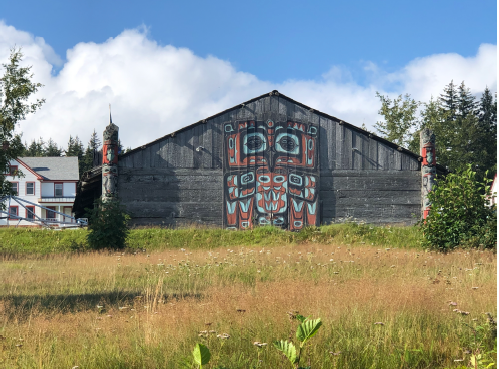
- Details
- By Native News Online Staff
The National Park Service announced $603,149 in grants on Monday for 10 projects across Indian Country in protection of America’s Native cultures.
“These grants help the National Park Service work with American Indian Tribes and Alaska Native organizations to preserve their cultural heritage and reconnect people with their traditions of the past that help inform their future,” National Park Service Director Chuck Sams (Umatilla) said.
A sample of the type of projects funded by the grant include:
- The stabilization of the Noow Hit Tribal House for the Chikoot Indian Association in Haines, Alaska. This traditional gathering place for the Tlingit people is listed in the National Register of Historic Places.
- The Wyiot Tribe’s workshops to train Tribal citizens in California to become Tribal Monitors, so they can engage in site preservation and public education in a meaningful way.
- The Prairie Band Potawatomi Nation’s plan to conduct Oral Histories of approximately 40 Tribal elders in Kansas to preserve the historical account of the Nation and its people, their cultural heritage and traditional practices.
The National Park Service see these projects as important to preserve tribal heritage for future generations. Other projects funded by these grants will locate and identify cultural resources, preserve historic properties listed in the National Register of Historic Places, support comprehensive preservation planning, preserve oral history and cultural traditions, provide training for building a historic preservation program, and support cultural and historic preservation interpretation and education.
Congress appropriated funding for the Tribal Heritage Grant Program in 2022 through the Historic Preservation Fund (HPF). The HPF uses revenue from federal oil leases on the Outer Continental Shelf to assist with a broad range of preservation projects, mitigating the loss of a nonrenewable resource with the preservation of other irreplaceable resources, without expending tax dollars.
Awards
Alaska, Anchorage
Shuyak Island Archaeological Survey
Koniag, Inc.
$74,997
Alaska, Chickaloon
Talkeetna Survey
Chickaloon Native Village
$47,959
Alaska, Haines
Stabilization of the Noow Hit Tribal House
Chilkoot Indian Association
$74,889
Arizona, Scottsdale
Survey of Significant Places: An Integrated Tribal Cultural Landscape Approach
Salt River Pima-Maricopa Indian Community
$74,230
California, Loleta
Wiyot Ancestral Territory Cultural Resource Monitor Training
Wiyot Tribe
$75,000
California, Santa Ysabel
Survey of Ancestral Places
Mesa Grande Band of Mission Indians
$49,998
Kansas, Mayetta
Prairie Band Potawatomi Nation Oral History Project
Prairie Band Potawatomi Nation
$74,941
Michigan, Mount Pleasant
Mt. Pleasant Indian Industrial Boarding School Pre-preservation Study
Saginaw Chippewa Indian Tribe of Michigan
$46,000
Oklahoma, Durant
Pushmataha Hall and Classroom Building at Wheelock Academy Feasibility Studies
Choctaw Nation of Oklahoma
$65,108
Oklahoma, Quapaw
Quapaw Nation Oral History Project
Quapaw Nation
$20,027
Total $603,149
Applications for at least $500,000 in 2023 funding will be available in winter 2023. For more information about the grants and the Tribal Heritage Grant program, please visit the Tribal Heritage grants website.
For more information about NPS historic preservation programs and grants, please visit the State, Tribal and Local Plans and Grants division website.
More Stories Like This
Native News Weekly (August 25, 2024): D.C. BriefsNavajo Nation Gaming Enterprise Marks Problem Gambling Awareness Month With $3.4M in Support
Cheyenne River Youth Project to Celebrate Women’s Strength at Barbie-Themed Passion for Fashion on March 14
Celebrating Native American Women
Native Bidaské: The Illusion of Freedom and the Myth of America 250, Leonard Peltier Speaks Out
Help us defend tribal sovereignty.
At Native News Online, our mission is rooted in telling the stories that strengthen sovereignty and uplift Indigenous voices — not just at year’s end, but every single day.
Because of your generosity last year, we were able to keep our reporters on the ground in tribal communities, at national gatherings and in the halls of Congress — covering the issues that matter most to Indian Country: sovereignty, culture, education, health and economic opportunity.
That support sustained us through a tough year in 2025. Now, as we look to the year ahead, we need your help right now to ensure warrior journalism remains strong — reporting that defends tribal sovereignty, amplifies Native truth, and holds power accountable.
 The stakes couldn't be higher. Your support keeps Native voices heard, Native stories told and Native sovereignty defended.
The stakes couldn't be higher. Your support keeps Native voices heard, Native stories told and Native sovereignty defended.
Stand with Warrior Journalism today.
Levi Rickert (Potawatomi), Editor & Publisher


